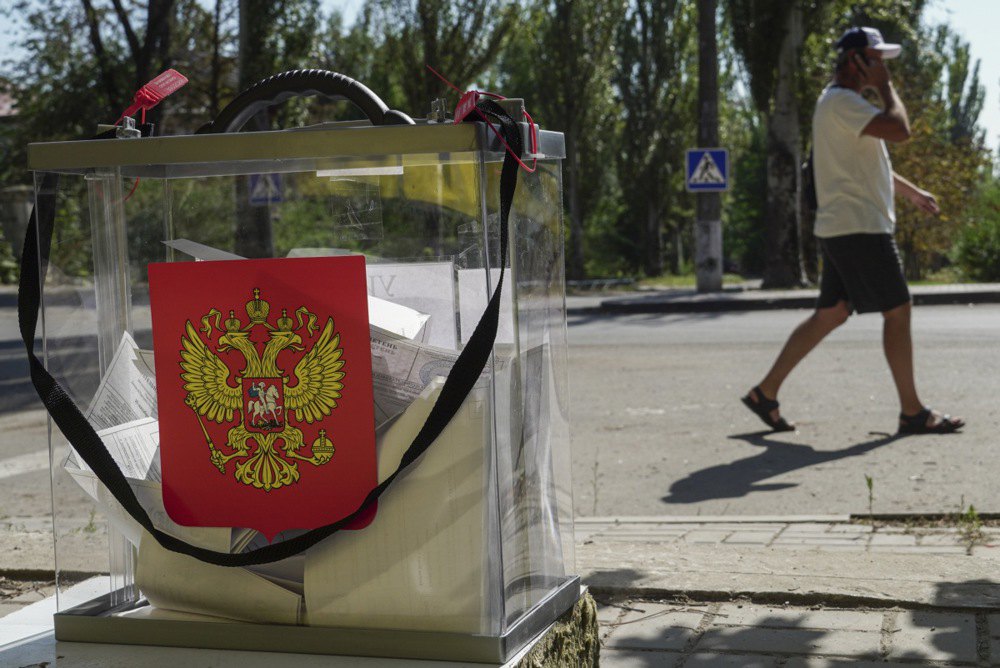Kremlin is trying to hold the pseudo elections in the seized Ukrainian territories. The objective of such fake expression of will is to politically integrate the occupied territory into Russia’s space. “Elections” were announced for September, 8–10, when Russia has a “single voting effort” — these are three days in a row when citizens of the aggressor state elect local authorities. However, since September 1, the so-called “field commissions,” accompanied by the armed Russian military, have been visiting people door-to-door to force people to vote.
The “election process” in the occupied territories is exploiting Ukrainian children in their “election campaigns.” They forcefully engage the staff from budget-funded institutions, use the funds from the Russian budget in the interests of pro-government candidates, and hand out food gift packages, which appears rather miserable amidst the destitution of local population.
At the same time, the pseudo-elections in the occupied territories are illegal, null and void, and go against international and Ukrainian law. The very fact they are conducted, regardless of the results, is not going to be recognized by Ukraine, nor by the world. Moreover, since our country has a goal of liberating all the temporarily occupied territories, for Ukraine, these “elections” will not change anything.
“Election” Campaigning as a Tool For War Propaganda
On the “single voting day” from September, 8 to 10, 2023, Russia is having election campaigns of different levels, such as the by-elections for members of the State Duma, heads of the Federation subjects, deputies to legislative authorities and municipal associations. In addition, Russians plan to run pseudo-elections for 79 occupation municipal associations and “legislative bodies” in parts of Donetsk, Luhansk, Kherson, and Zaporizhzhia Oblasts, as well as the “by-elections” to the State Duma in the occupied Crimea.
However, elections in Russia, even except for the occupied territories, are a far cry from the democratic process. For the authoritarian Kremlin regime, the institution of elections is now a formality required to keep the power and create their positive image as a “liberal structure.”
Even the Kremlin’s spokesperson, Dmitriy Peskov, admitted that the presidential elections in Russia are not the democratic process but the “road of bureaucracy.” However, the current election campaign is permeated with the propaganda around the “special military operation” and heroization of its participants.
Each party and their local cells deem it as their duty to send the humanitarian packages to soldiers or to citizens in the occupied territories, or to raise funds for military goods. Thus, the party “Fair Russia – Patriots – For Truth” posted addresses of centers to receive humanitarian assistance. To help the Donbass citizens, they organized the fundraiser through a short mobile number.
The delivery of field kitchen trucks, portable radio sets, sighting devices, medications, wood, motor vehicles, or trench candles to the occupied territories has become a key element of the electoral campaigning for political parties.

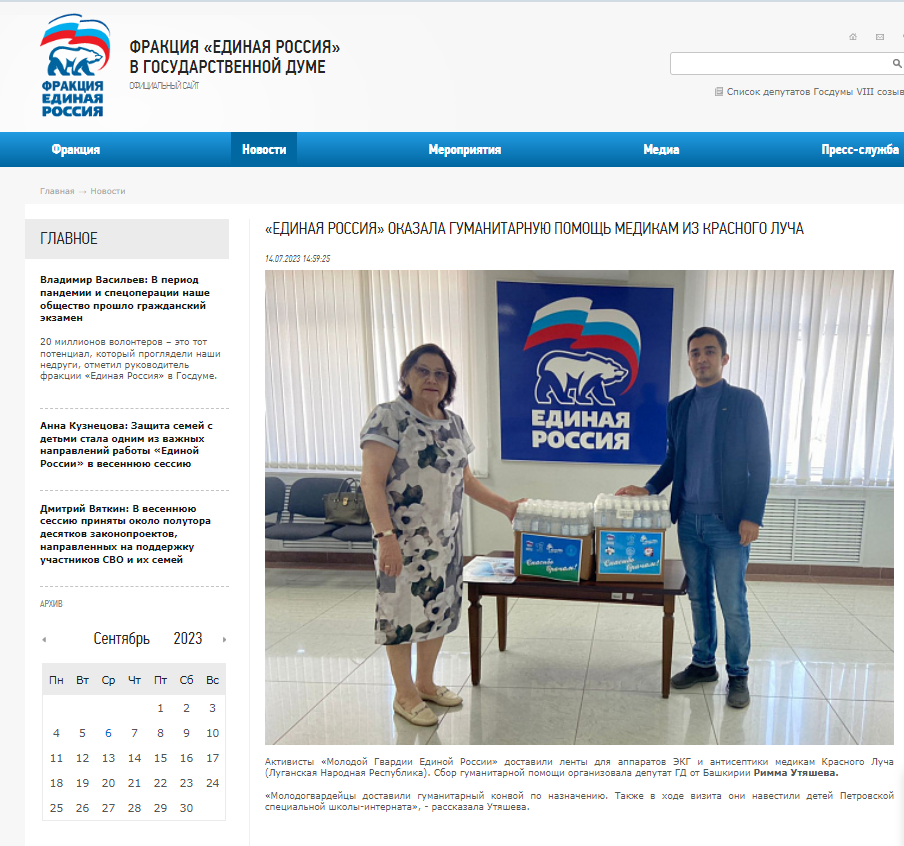
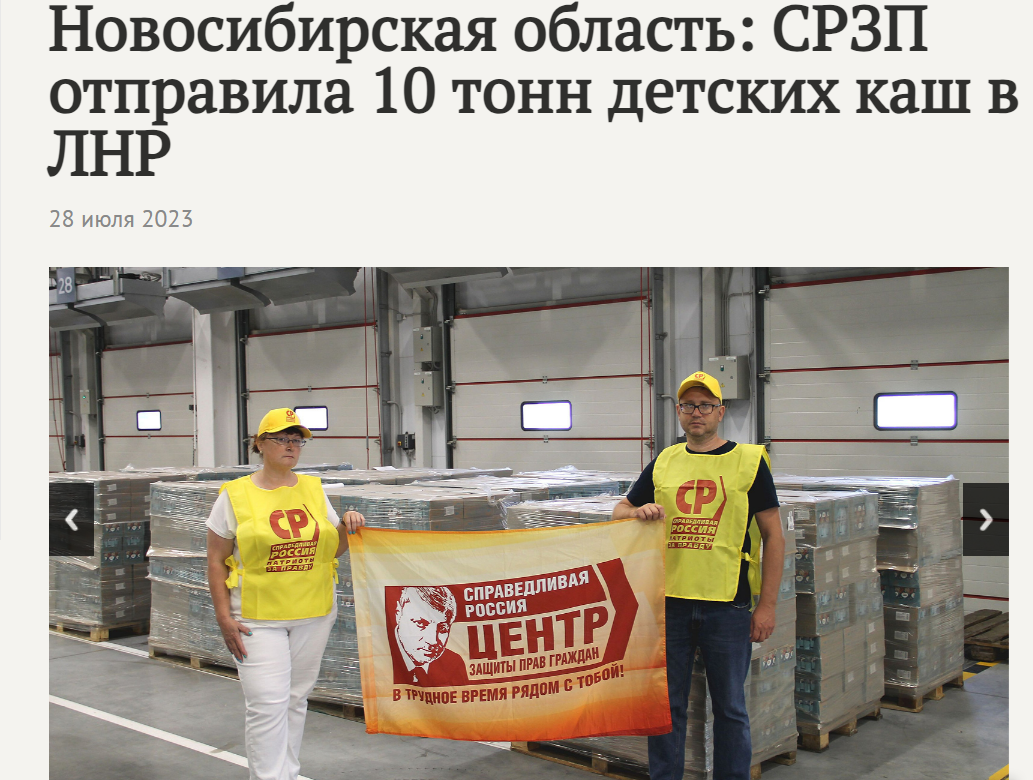
Even with this imitation of elections, Russian politicians failed to offer to their voters any meaningful campaign. They rather used the topic of war: they conducted the motor rallies to support the SMO, events commemorating victims in the war in Donbass; award ceremonies for veterans and their families. Besides, Russian politicians address living issues of the combatant family members, such as they helped install gas infrastructure at the place of a mother of a SMO member, or supported in taking the treatment.
Political parties hand out food gift packages to veterans who were rendered disabled by the Kremlin’s imperialistic aspirations, they help them enter universities, protect their right to work, take war combatants’ families under the patronage.
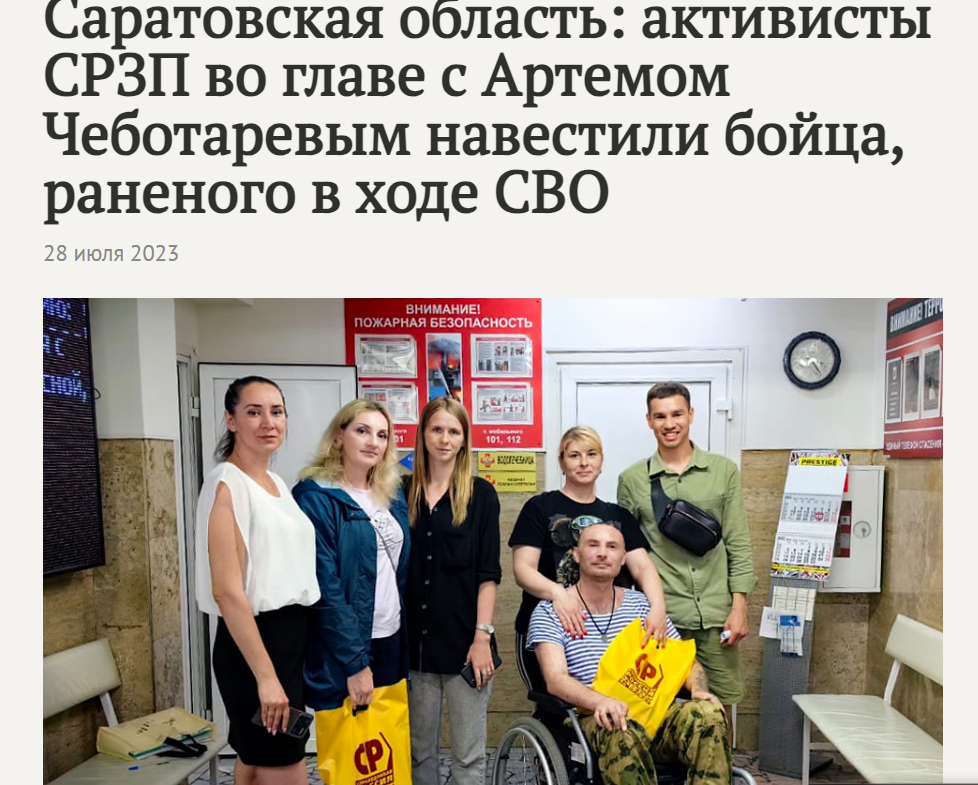
The candidates seem to be competing in most intricate ways to make use of the bloodshed in Ukraine. Thus, a candidate from the FRPT to the position of Moscow City Mayor, Dmitriy Gusev intends to rename the Taras Shevchenko seafront to Donbass Angels, and the Liberal Democratic Party of Russia (LDPR) plans to establish a “Museum of Victory” dedicated to the SMO combatants.
It must also be mentioned that Russia’s electoral campaigning does have some provisionally meaningful slogans and promises to change Russian laws. However, the change vector is most often about military track, and the introduction of additional social guarantees for the participants of “special operation” and their family members.
The RF State Duma promises preferences to war supporters. Politicians suggest releasing loan guarantors from loan liabilities, creating quotas for free tuition for children of war veterans in private kindergartens, schools, or universities; granting a status of a war veteran to the so-called “war correspondents,” increasing financial assistance to war combatants, etc.
Therefore, in the context of the ongoing military aggression, Kremlin is using “elections” as a tool for internal propaganda. With no political competition and eradication of alternative news sources, Kremlin parties use the “electoral campaigning” to impose on Russians the hatred against Ukrainian people, and prepare them for the long war.
Furthermore, Russia also planned the pseudo elections in the occupied territories of Ukraine. How is the campaigning different in the TOTs and what objectives does Russia pursue?
Kremlin needs the “victory” of a loyal “environment of collaborators”
Civil Network OPORA previously wrote that Kremlin is using pseudo elections in Ukraine’s seized territories to drag Ukrainian citizens into political life of Russia, and “legalize” occupation authorities. In order to have formal grounds for the “elections,” Russia even changed the law. OPORA’s legal; advisor, Pavlo Romaniuk, highlights that the civilized world will not recognize Russia’s sovereignty over the occupied territories of Ukraine, and the conduct of elections or referenda on those territories will have no legitimate power or legal consequences.
At the same time, the imitation of elections intends more other things than the “alternative history-making.” Political expert Oleksandr Kliuzhev believes that pseudo elections in the temporarily occupied territories tighten the stranglehold of collaboration with the occupiers for local citizens. According to the expert, participation of Ukrainian citizens in the pseudo elections, such as to save their business or through coercion, rather than for political affiliation, may cause fear for being punished for collaboration. As a result, it would push people to collaborate even more with the occupiers.
“Pseudo elections are a mechanism to build an environment of collaborators who have passed the point of no return. In this regard, the fake elections are the real and dangerous instrument to support the occupation. Moreover, simulation of elections by the RF is also a formal procedure of distributing bonuses among local and newly arrived villains, the criminals who supported the seizure of Ukrainian territories and are now expecting to be gratified by the occupiers,” highlights Oleksandr Kliuzhev.
Besides, since Kremlin cannot achieve the declared goals of the “special operation,” they need to demonstrate support for Vladimir Putin in the occupied territories and ensure maximum results for the pro-government party “United Russia.” That is how Putin wishes to show the alleged success of the invasion, support for Russian authorities, and efficiency of local elites.
A propos, in August, during the recent meeting with Putin, Zaporizhzhia-based gauleiter Yevgeniy Balitskiy tried to reassure that the Russian dictator enjoys 87% of support in the region, and the “United Russia” has 71% of supporters. On the other hand, the Russian center for public opinions emphasized that the “United Russia” leads more in TOTs than generally in the country.
“Russians also find it critical to demonstrate to local people the seriousness of their intentions to control the occupied territories. That is why the scale of “electoral campaigning” needs to be large to showcase such intentions. The big picture of pseudo elections in the occupied territories of Ukraine is supposed to show to common Russians that Putin managed to hold his position in the seized lands, despite all the previous failures and setbacks,” explains Oleksandr Kliuzhev.
In fact, “United Russia” runs the largest scale “election campaign” in the occupied territories, and registered the highest number of candidates. Thus, Putin’s party registered 312 candidates for the legislative occupation councils of the “new subjects of the RF” (according to how the annexed Ukrainian territories are called in Russia — ed.). The FRPT nominated 300 candidates, the Communist Party of the Russian Federation (CPRF) — 276, LDPR — 255, and “New People” — 178.
By the way, the “New People” were least optimistic about the possibility of holding pseudo elections in the settings of Ukrainian counteroffensive since the party had not registered any candidates in Kherson and Zaporizhzhia Oblasts.
On the other hand, other parliamentary parties were active in holding candidate nomination conferences. The pro-government party “United Russia” nominated to the occupation parliaments of the regions the following top numbers: Saldo, Balitskiy, Pushilin, and Pasichyk. What is more, the lists are often headed by the deputies of the State Duma such as Ihor Kastiukevich and Viktor Vodolatskiy.
Other faces in the party lists are local collaborators. For example, they are the commander of the illegal armed formation “Sparta” Artem Zhoga (who use currently under the EU sanctions), director of the center for motherhood and childhood in Donetsk Anna Zheleznaya (who was granted by Putin a “title” of the merited health professional), organizer of “anti-Maydans” and events for the protection of the Russian language in Luhansk region, Denis Miroshnichenko, owner of the “Khersonlift” holding Elena Dmitruk, a widow of the ex-MP and a councilor of Kherson regional council Mykola Dmitruk.
Some parties held their candidate nomination conferences rather modestly. For example, the LDPR only had one combined conference in Rostov region with the slogan “Zhirinovskyi forever!”
The CPRF also nominated the “responsible teams.” In particular, in the occupied part of Kherson region, communists commandeered in Genichesk the house of the driving school and arranged a regional “party cell” there. The main communist of the region is now Ramil Zamaletdinov who arrived to Kherson region from Moscow and compiled the lists of communist supporters to be enrolled to Kherson “regional duma.”
Another parliamentary RF party, the FRPT, also nominated candidates for the occupation authorities. In Donetsk region, the conference was held by the “cell” leader and a State Duma member Elena Drapeko. In Kherson region, the face of the party is Igor Shchepelin who used to work as a chief of legal department of Korabely city district council in Kherson, and was the councilor there from the Party of Regions. In Zaporizhzhia Oblast, the party list is led by Melitopol collaborator Yuriy Onishchuk. He used to be a deputy in the city council from the Opposition Bloc, and through collaboration with the occupiers, he illegal became chief of local water management facility.
“Candidates” Are Actively Using Ukrainian Children In Their “Campaigning”
To organize and conduct the pseudo elections in the occupied territories, Russians changed the law to make sure that now the Kremlin has all mechanisms to obtain any results.
However, Russian parties decided to create the illusion of democratic processes and set out to “campaign.” An important component of the so-called electoral campaigning from Russian parties was the cynical exploiting of Ukrainian children. Kremlin masters killed over 500 and deported ab. 20,000 Ukrainian children but it did not stop the Russian villains from organizing the showcase PR campaigns.
Russian “candidates” started massively offering to Ukrainian children to go for vacation to Russia and in the occupied Crimea, while attaching party symbols to the effort. Occupiers send children hundreds of kilometers into the Russian territory but those trips may be used to commit crimes. The National Resistance Center reports that under the pretext of recreation and vacation trips, the invaders take children to their territory to abduct them, thus continuing the genocide of Ukrainian people.
“When children from the occupied territories are used for propaganda to be further taken to Russia, and when they never return, it may lead to illegal deportation and relocation of children from Ukraine’s occupied territories to Russia. In this case, it will also violate the Geneva Convention, and may be treated as a war crime. Such actions of Russians fall not only under the national jurisdiction but also under the jurisdiction of the International Criminal Court,” explains OPORA’s legal advisor Pavlo Romaniuk.
In addition, as part of “electoral campaigning,” occupiers actively organize entertaining programs where they hand out branded products, and the deputies of the State Duma exhibitory hug Ukrainian children and present them the gifts of candies and fruit. Moreover, the occupiers put on children the branded T-shirts, too.

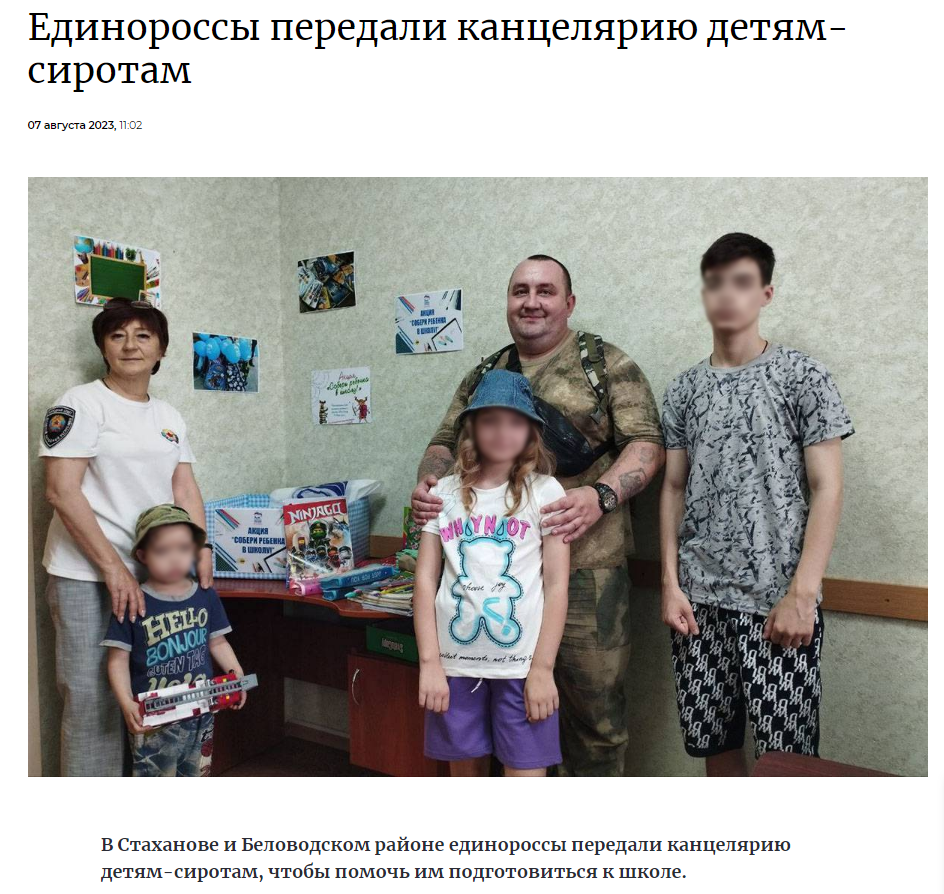
Another area of “care” is the preparation of children for school. It is a common electoral practice for the “United Russia” members to run a campaign “help a child get ready for school.” This way, they use children for promotion. Moreover, the single voting day in Russia falls on the first days of September, which is very convenient. The campaign also covered the occupied territories where the political party handed out schoolbags and stationery, paired with propaganda materials entitled “Knowledge About Heroes.”
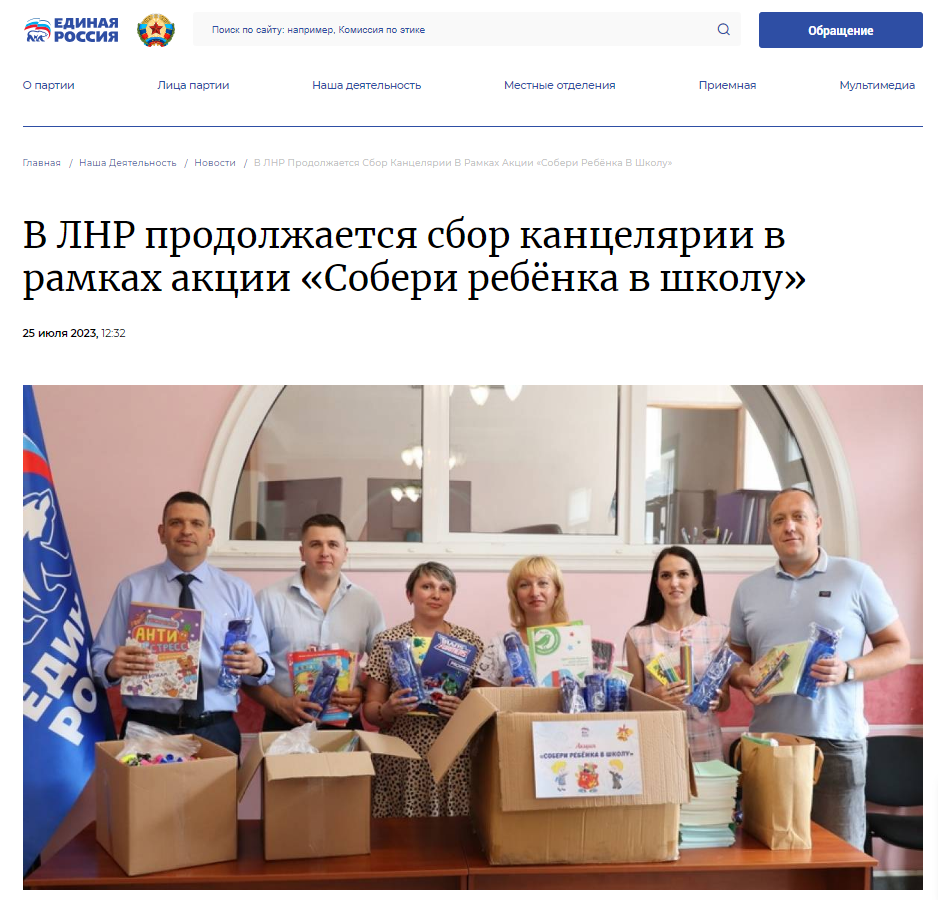
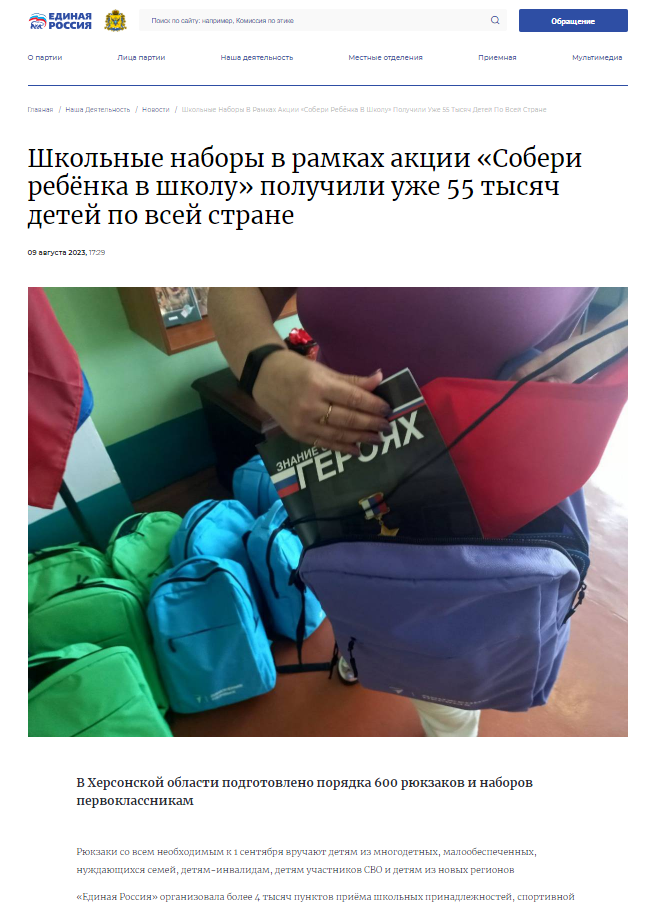
However, the occupiers feel they are not welcome in the Ukrainian land, even in schools. Thus, the leader of United Russia party cell in Kherson region, Igor Kastiukevich, during a meeting with mothers in a kindergarten, barged in with the armed bodyguards. This must be the face of the Russian world utopia.
You can’t do without the buckwheat and the government “problem-solvers”?
Russian full-scale invasion pushed many Ukrainian people in the occupied territories beyond the poverty line. Vladimir Putin used the “liberated” Luhansk Oblast as an illustration, and admitted that people there have “modest income, to put it mildly”, and also in the settings of growing prices.
Russian authorities provoked the social and economic decay in the occupied territories but still are not ashamed to play with the problems of people in their campaigning. Politicians and “candidates” in the occupied territories are actively handing out branded humanitarian and other aid: tapes for ECG devices and antiseptics to doctors, books for libraries, clothes and food to pensioners, wheelchairs, washing machines for centers for temporary accommodation of Ukrainian people, etc. Russian politicians even presented watermelons to people affected by the destruction of Kakhovka dam.
Every political party tried to show maximum “care” for the residents from the occupied territories. Although it even goes against the Russian legislative provisions of electoral campaigning, they could be easily neglected to get a picture of “happy” people with the kind members of parties.
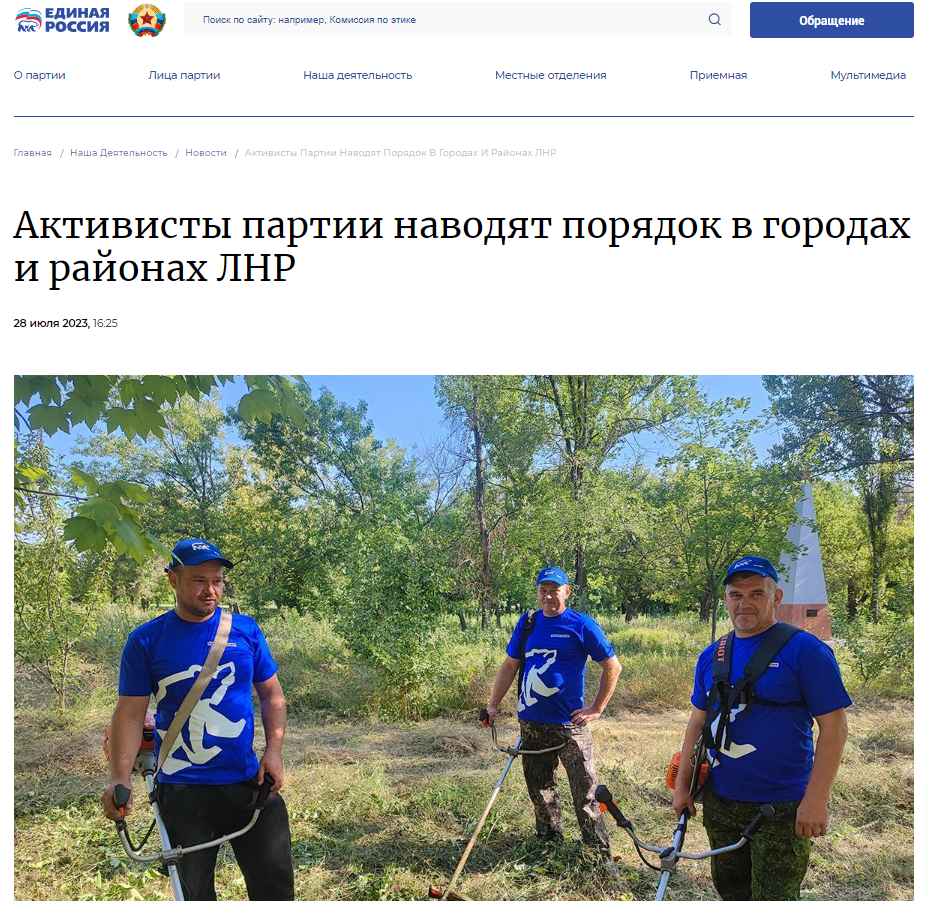
Current LDPR leader, Leonid Slutskiy, went even further and suggested lifting the ban on charity activities for candidates. But as we can see from the frenzied activities of party-related benefactors, no changes to the law were required to make.
Russian political parties made sure they offered gibs for the front. For example, they presented spare parts for Grad systems, which fully fits Kremlin’s policy to “protect people willing to speak Russian.” In addition, the so-called candidates sent to Russian soldiers the sighting devices, guard boats for security of Dnipro river, repair kits for combat vehicles, thermal cameras, and drones.
Another interesting element of the “electoral campaign” in the occupied territories is the recovery of infrastructure and landscaping. Thus, the “United Russia” members took along the flags and branded T-shirts, and rushed to mow the grass, to install playgrounds, to repair house roofs, social facilities, a.o.
At the same time, they also engage communal service workers and make them wear party-branded shirts. It is highly probable that they are taken hostage of the situation: people have to participate in the political farce against their will, either by coercion or under the threat of dismissal.
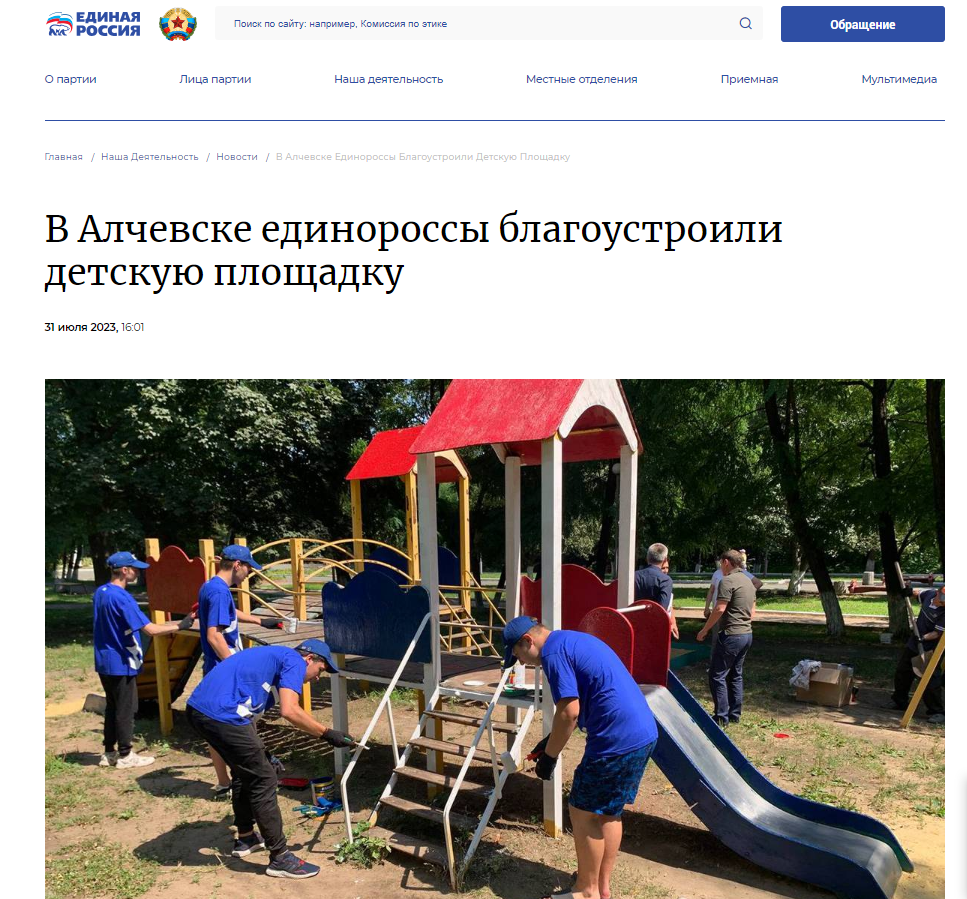
Yet, one of the largest and most promoted “campaigning events” of the pro-government party was the implementation of the “people’s Program” in the temporarily occupied territories. It is an initiative when “candidates” or party representatives collect comments and preferences from residents addressing various issues, from the school repairs to the installation of street benches, and mounting energy saving lamps.
For example, under this “strategic program,” occupiers allegedly build a multifunctional center and sports grounds, they repair schools and kindergartens, replace windows, and do many other things. However, the “program” is directly financed from the Russian budget: in July, 2023, “United Russia” and Russian government adopted the allocation of funds for its purposes.
What can be done about it?
According to Pavlo Romaniuk, Ukraine needs to resist the conduct of illegal elections. The best solution would certainly be the liberation of the territories but until it lasts, other tools could be used. Among other things, diplomatic pressure on Russia could be intensified, people could be brought to justice under the Ukrainian law when they engage in the organization of illegal process or publicly encourage to support it.
The lawyer also added that to counteract the illegal elections, Ukrainian law-enforcement shall investigate all signs of collaboration activities, including also the organization of illegal elections and referenda in the occupied territories.
“Law enforcement system faces serious challenges related to the collection of evidence base in the occupied territories, which can only be accessed after their de-occupation. In any case, investigators need to find ways to prove their fault,” says Pavlo Romaniuk.
We hope that that the Ukrainian Army and the law-enforcement would handle the hard tasks and challenges they face today. Sooner or later, our country will reclaim the territorial integrity, liberate all our territories and people who fell prey to circumstances and hostages to the occupiers. As to those who were deliberately helping enforce the aggressor’s policy in the occupied territories, such as organized the pseudo-referenda and “elections,” will face the just punishment.
